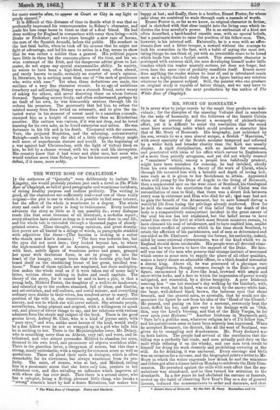THE WHITE ROSE OF CHAYLEIGH.*
Jr the authoress of "Queechy" were deliberately to imitate Mr. Kingsley, she would probably produce just such a novel as The White Bose V Chayleigh, as full of good paragraphs and wearisome incidents, of strong healthy purpose and endless prolixity. The writing is good, all the characters are sufficiently real—and one of them really original—the plot is one in which it is possible to feel some interest, but the effect of the whole is wearisome to a degree. The whole story and each of its parts is long to tediousness. Every incident advances the story as little as it can possibly do ; every dialogue reads like that most tiresome of all literature, a verbatim report; every situation lasts almost as long as it would have done in real life, and the whole tale is extended through a thousand pages of closely- printed octavo. Clear thought, strong opinions, and great descrip- tive power are all buried in a deluge of words, in paragraphs studded with adjectives like these—(The heroine is looking at a suitor who stands near Kiss's Amazon.) "The face was towards her, but the eyes did not meet hers ; they looked beyond her, to where the high-mounted figure of an Amazon, prompt and undaunted, with bent, subtle figure of wondrous power and grace, grasped her apear with dexterous force, in act to plunge it into the heart of the hungry, savage brute that with terrible grip, had fas- tened itself on the shuddering breast of her great, terrified war- horse." None of those epithets are misplaced, but their multiplica- tion makes the whole read as if it were taken out of some lady's letter, written about nothing in italics and small capitals. The theory of the story., for it cannot be said to have a plot, is that a young lady, Mildred Foster, the daughter of a well-to-do landowner, and educated up to the modern standard, full of ideas, and Goethe, and art-criticism, and self-culture, and social science, and everything ordinary men dislike in their wives, has resolved never to marry. The position of tbe wife is, she conceives, unjust, a kind of domestic slavery, and one to which she will never submit. She attracts people, nevertheless, being piquant and original, with a willingness to speak out, and plenty of clever things to say, and her relations with various admirers form the staple and subject of the book. There is the good genius lover, Aubrey St. Clair, who is a kind of joyous saint, with "pure eyes," and who, unlike most heroes of the kind, would really be a fine fellow were he not so wrapped up in a girl who tells him he is nothing to her. There is the Mephistopheles lover, Mr. Delacy, who is something more than an Atheist, very tall, and worn, and in- tellectual, and who almost persuades Mildred to abandon her aims, descend to his own level, and pronounce all objects worthless alike. There is the guardian lover, a clergyman of course, but this time a strong, manly ecclesiastic, with a capacity for common sense as well as quotations. These all plead their suits in dialogue, which is often remarkable for its cleverness, but always wearisome from its pro- lixity. The saint, of course, wins at last, and Mildred, telling him in a passionate scene that she loves only him, persists in her ridiculous vow, and dies.exhalin,g an influence which improves all with whom she has ever dealt. Then there is a second sister, who has a sub-plot, being a flirting, pleasant little thing, who -breaks a "strong" cousin's heart by half a dozen flirtations, but makes him • YU White Bose of Chaykigh. Hurst sad Blsekett.
happy at last ; and finally, there is a brother, Ernest Foster, for whose sake alone we contrived to wade through such a cascade of words.
Ernest Foster is, so far as we know, an original character in fiction, and is sketched with that clear insight into the living man which in- dicates the true novelist's power. He is an enthusiast of a kind not often described, a hard-headed capable man, with no special beliefs, but a passionate desire to raise the position of his fellow-men. This, however, is his internal self. Externally, he is a man with an affec- tionate face and a bitter temper, a coward without the courage to look his cowardice in the face, with a habit of saying the most irri- tating things he can think of, yet with an irresistible crave to be loved which leads him into a foolish match. This composite character is portrayed with extreme skill, the man developing himself under little touches which the reader scarcely notices, yet does not forget, but even here the same vice of prolixity manifests itself. Ernest never does anything the reader wishes to hear of, and is introduced much more as a highly-finished study than as a figure having any relation whatever to the general subject. Still, the painter who can produce an original study is capable of better things, and we may have to review more pleasantly the next production by the author of The White Rose of Chayleigh.






























 Previous page
Previous page